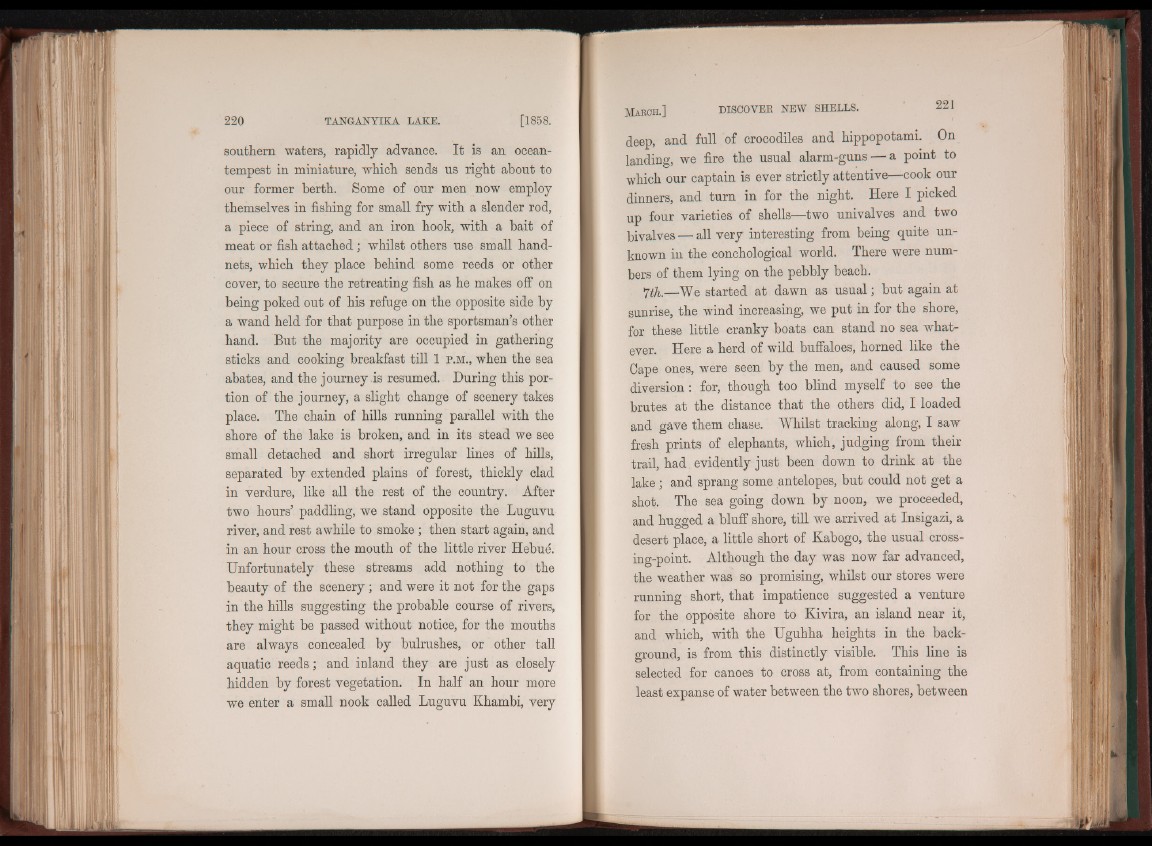
southern waters, rapidly advance. I t is an ocean-
tempest in miniature, which, sends us right about to
our former berth. Some of our men now employ
themselves in fishing for small fry with a slender rod,
a piece of string, and an iron hook, with a bait of
meat or fish attached; whilst others use small hand-
nets, which they place behind some reeds or other
cover, to secure the retreating fish as he makes off on
being poked out of his refuge on the opposite side by
a wand held for that purpose in the sportsman’s other
hand. But the majority are occupied in gathering
sticks and cooking breakfast till 1 p .m ., when the sea
abates, and the journey is resumed. During this portion
of the journey, a slight change of scenery takes
place. The chain of hills running parallel with the
shore of the lake is broken, and in its stead we see
small detached and short irregular lines of hills,
separated by extended plains of forest, thickly clad
in verdure, like all the rest of the country. After
two hours’ paddling, we stand opposite the Luguvu
river, and rest awhile to smoke ; then start again, and
in an hour cross the mouth of the little river Hebud.
Unfortunately these streams add nothing to the
beauty of the scenery; and were it not for the gaps
in the hills suggesting the probable course of rivers,
they might be passed without notice, for the mouths
are always concealed by bulrushes, or other tall
aquatic reeds; and inland they are just as closely
hidden by forest vegetation. In half an hour more
we enter a small nook called Luguvu Khambi, very
deep, and full of crocodiles and hippopotami. On
landing, we fire the usual alarm-guns — a point to
which our captain is ever strictly attentive—cook our
dinners, and turn in for the night. Here I picked
up four varieties of shells—two univalves and two
bivalves — all very interesting from being quite unknown
in the conchological world. There were numbers
of them lying on the pebbly beach.
*jth.—We started at dawn as usual; but again at
sunrise, the wind increasing, we put in for the shore,
for these little cranky boats can stand no sea whatever.
Here a herd of wild buffaloes, horned like the
Cape ones, were seen by the men, and caused some
diversion : for, though too blind myself to see the
brutes at the distance that the others did, I loaded
and gave them chase. Whilst tracking along, I saw
fresh prints of elephants, which, judging from their
tra il, had evidently just been down to drink at the
lake; and sprang some antelopes, but could not get a
shot. The sea going down by noon, we proceeded,
and hugged a bluff shore, till we arrived at Insigazi, a
desert place, a little short of Kabogo, the usual cross-
ing-point. Although the day was now far advanced,
the weather was so promising, whilst our stores were
running short, that impatience suggested a venture
for the opposite shore to Kivira, an island near it,
and which, with the Uguhha heights in the background,
is from this distinctly visible. This line is
selected for canoes to cross at, from containing the
least expanse of water between the two shores, between